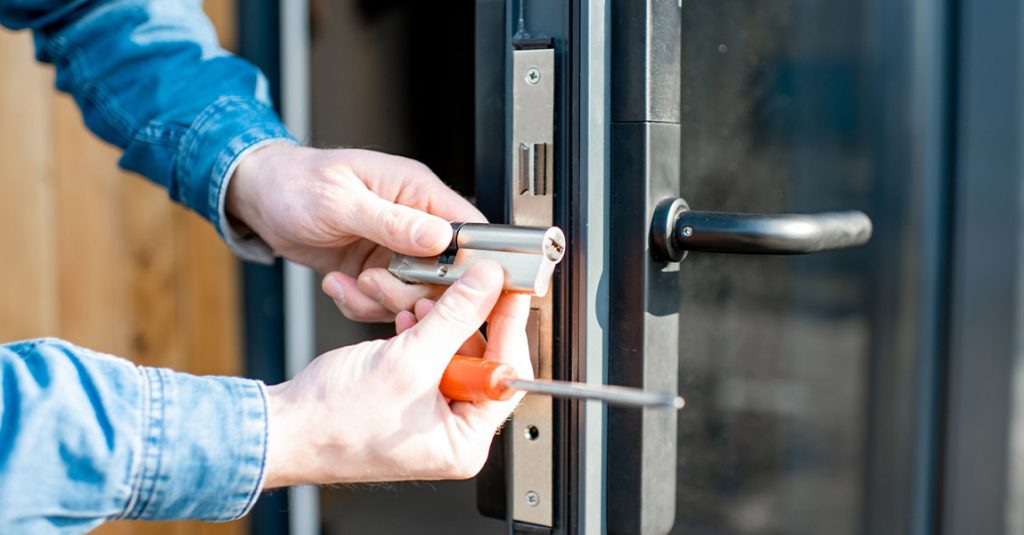Locks wear down slowly, so it’s easy to overlook early signs of trouble until the key gets stuck or the door stops closing properly. Knowing when to replace a lock can save you frustration and keep your property secure. Over time, exposure to weather, repeated use, and small internal shifts affect performance in ways that are not always visible. Understanding these warning signs helps prevent lockouts and ensures your doors continue to protect what matters most.
When Your Key Starts To Stick
A key that hesitates or requires extra effort to turn usually indicates that the lock’s internal pins have started to wear or misalign. At first, a little lubricant might seem to solve the issue, but if it becomes a recurring problem, it means the mechanism is deteriorating. Forcing a key can worsen the damage and eventually break it inside the cylinder.
Before that happens, we usually check whether the issue comes from a damaged key rather than the lock itself. Trying a spare key can confirm it. If all keys stick, the problem lies in the lock and not in the metal grooves of the key. Replacing the lock at this stage prevents sudden lockouts and potential security risks.
You can learn more about reliable replacement and installation solutions by visiting locksmith in Ottawa, where we discuss both residential and commercial options.
When the Lock Feels Loose or Moves Inside the Door
A properly installed lock should feel firm, with no movement when you turn the handle or insert the key. If it starts wobbling, that’s usually a sign that the internal screws or the latch assembly have loosened or worn out. Over time, this can make it easier for intruders to force entry and cause the lock to fail entirely.
A quick tightening might help for a while, but looseness often points to a deeper issue inside the locking mechanism. If the door itself shifts slightly on its hinges, that movement can also stress the lock. The safest approach is to remove the lock and inspect the mounting holes and latch plate. When the wood around the lock becomes damaged or stripped, replacement becomes essential for both security and function.
Rust, Corrosion, and Weather Damage
Ottawa’s seasonal changes affect locks more than people realize. Humidity, snow, and temperature swings can cause corrosion and moisture buildup inside the keyway. Once rust begins, it spreads quickly through the pins and springs, making the lock increasingly unreliable. Even a small amount of corrosion can prevent the key from turning smoothly.
Cleaning helps for a short time, but once corrosion sets in, the structural strength of the lock is already compromised. Outdoor locks, in particular, should be replaced with weather-resistant models. Stainless steel and brass tend to perform better under moisture and extreme temperatures. Taking preventive measures, such as applying a graphite-based lubricant before winter, helps extend the lock’s lifespan.
When You Move Into a New Home
Many homeowners overlook this, but replacing locks after moving in is one of the simplest ways to improve home security. Even if the previous owner handed over all the keys, there’s no guarantee duplicates don’t exist. Contractors, cleaners, or neighbors could still have copies. Changing the locks gives you full control over who has access.
When replacing locks in a new property, it’s worth considering a master key system or rekeying for convenience. Rekeying can be an affordable alternative when the hardware itself is still strong, as it involves changing the pin configuration rather than replacing the whole lock. For homeowners who want to explore options like this, our residential locksmith Ottawa services cover both traditional and smart locks designed for modern needs.
Difficulty Locking or Unlocking the Door
If the door requires pushing or pulling to engage the lock, it’s not just an inconvenience. It might mean the door frame has warped, the latch is misaligned, or the strike plate has shifted over time. Wooden doors expand and contract with humidity, causing misalignment that affects how the lock connects with the latch.
A locksmith can often adjust the strike plate or hinges to realign the door. However, if you need to force the key or repeatedly jiggle it to engage the lock, it’s safer to replace it altogether. Repeated stress on the internal pins can lead to sudden breakage, especially in colder months when metal contracts.
Visible Damage or Signs of Forced Entry
Scratches, dents, or bent keyholes are not just cosmetic issues. They often indicate attempted tampering. A lock that has been forced or manipulated, even slightly, loses much of its original strength and can fail without warning. Once compromised, it’s impossible to trust that lock again.
In such cases, we recommend immediate replacement. It’s also wise to evaluate the surrounding area, like door hinges and strike plates, for additional reinforcement. Strengthening the entry point with a higher-grade deadbolt or reinforced hardware improves long-term safety, especially for ground-level doors.
After a Breakup, Roommate Change, or Employee Turnover
Any situation involving a change of access—whether personal or professional—requires reconsidering who holds your keys. Replacing locks after a roommate leaves or an employee departs from a business ensures that only current, authorized people can enter. It’s an easy step to prevent tension or risk.
For businesses, turnover often means multiple keys circulate among employees or service providers. Replacing locks or rekeying them maintains accountability. You can review commercial options tailored to offices and retail spaces through our commercial locksmith Ottawa page, where we discuss security upgrades and system maintenance practices.
Frequent Jamming or Spinning Cylinders
When a lock cylinder turns freely without engaging the latch, that’s a clear sign something inside has broken. Sometimes, the tailpiece or cam has disconnected, leaving the cylinder to spin uselessly. Other times, dirt and worn pins prevent proper engagement. Either way, a spinning lock is beyond repair in most cases.
If the lock jams frequently, it could be a sign of internal spring failure. Springs lose tension over time, especially with heavy use. Lubrication can mask the issue temporarily, but once mechanical wear begins, replacement becomes unavoidable.
Modern Security and Insurance Requirements
Insurance companies sometimes require locks that meet specific standards, especially for commercial properties or rental units. Older locks may not meet these security standards, even if they still function. If you’ve had your locks for over a decade, it’s worth checking if they comply with current safety guidelines.
Upgrading doesn’t always mean going digital. Many mechanical locks today include reinforced bolts and anti-pick technologies that enhance safety without requiring smart features. For homeowners, replacing outdated locks can also reduce insurance premiums, as newer locks lower the risk of break-ins.
When Keys Get Lost More Than Once
Everyone misplaces keys occasionally, but if it happens frequently or if a lost key can’t be traced, replacing locks becomes a necessity. Relying on spare keys only delays the problem. In homes or offices with multiple occupants, key management can quickly become disorganized.
Instead of duplicating new keys each time, it may be more practical to install a lock system with restricted key duplication or consider a keypad entry. These prevent unauthorized copies and allow easy code changes when needed. That way, security remains consistent without frequent hardware replacements.
Simple Maintenance Tips To Extend Lock Life
While some lock problems require replacement, regular maintenance helps prevent premature wear. Keeping locks clean and lubricated is the most effective way to extend their lifespan. Avoid oil-based lubricants, which attract dust, and instead use graphite or silicone-based options.
Inspect your locks at least twice a year. Look for signs of looseness, misalignment, or buildup around the keyhole. When possible, keep keys clean and avoid using the same one across different locks, since wear patterns differ and can transfer damage between them. Small habits like these delay mechanical wear and save you from costly replacements.
Why Replacement Matters Beyond Security
A well-functioning lock also affects your sense of comfort. Knowing your door closes smoothly and securely changes how you feel about your space. Replacing old locks not only improves security but restores that quiet sense of safety we often take for granted.
Neglecting a worn lock might seem harmless until the day it fails at an inconvenient time—during freezing weather or late at night. Preventive replacement ensures your door will work when it matters most.
If you notice any of these issues or want to evaluate your locks, you can contact us to schedule an inspection or replacement.
FAQ
How often should locks be replaced?
Most locks last between seven and ten years under normal use. However, exposure to weather, heavy use, or poor maintenance can shorten that lifespan. Inspecting your locks regularly helps determine when they need replacement.
Can a locksmith fix a stiff lock instead of replacing it?
Yes, in some cases. If the issue comes from dirt or minor misalignment, cleaning and lubrication might restore function. But when internal parts wear out, replacement becomes the only reliable solution.
Should I rekey or replace my lock after losing keys?
Rekeying works when the lock itself is in good condition. It changes the key pattern without changing the hardware. If the lock is old, damaged, or corroded, full replacement is safer.
Is it worth switching to smart locks?
That depends on your needs. Smart locks offer convenience and easy access management but rely on power or batteries. Mechanical locks remain durable and simple to maintain, so the best choice depends on your lifestyle.
What kind of lock is best for exterior doors?
For most homes, a deadbolt with a solid metal bolt and reinforced strike plate offers strong protection. Weather-resistant materials like brass or stainless steel perform better in Ottawa’s changing climate.

